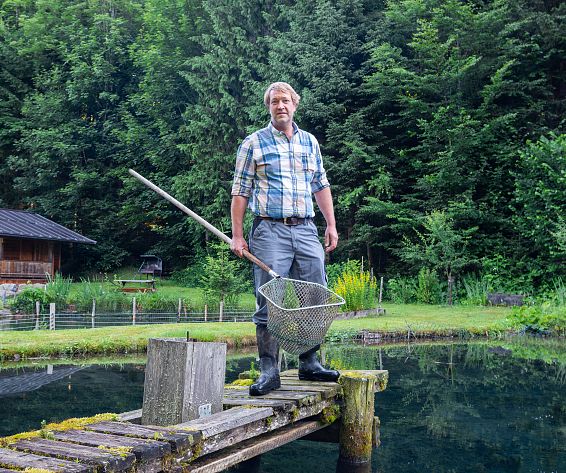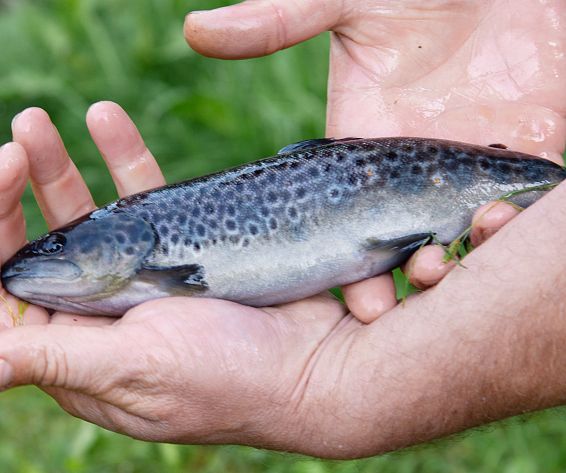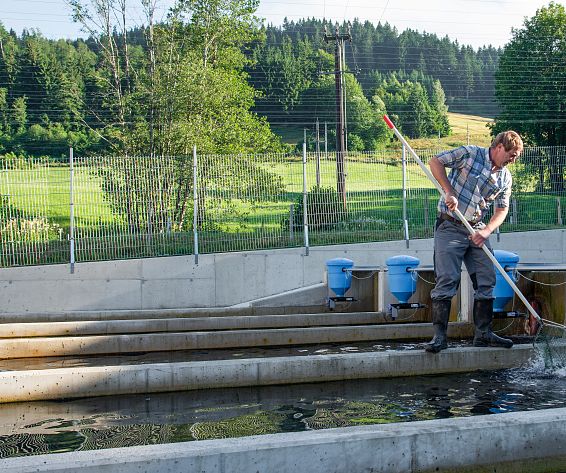Fish with added value: Why trout, char and other fish are real powerhouses
Fish is more than just a light meal - it provides essential building blocks for muscle strength, cell protection and a fit life. Preferably fresh, from clear alpine waters.
In the world of conscious nutrition, there is a lot of talk about superfoods - mostly exotic, mostly expensive. And yet one of the most valuable sources of protein is right on our doorstep: fish. Especially in the Alpine regions, where pure spring water and sustainable farming methods come together, a food grows that is hard to beat in terms of nutritional physiology.
Protein quality that sets standards
Protein from fish is one of the highest biological quality forms of animal protein. The body can utilise it particularly efficiently as the amino acid profile is almost ideally composed. Fish is therefore an ideal food for people who want to shape or regenerate their body through training: easily digestible, muscle-building and metabolism-activating. Compared to meat, fish also scores with a lower proportion of saturated fatty acids - without compromising on satiety or flavour.
Omega-3: Anti-inflammatory and heart-strengthening
What makes fish particularly valuable are its polyunsaturated fatty acids - especially the omega-3 fatty acids EPA and DHA. These act like silent directors of health in the body: they lower blood pressure, improve the flow properties of the blood, regulate cholesterol levels and inhibit inflammatory processes. For athletes, they are a natural protective shield for joints and the cardiovascular system - for everyone else, they are a preventative measure against the typical diseases of modern civilisation.
Vitamins and trace elements: small substances, big effect
Fish provides more than just macronutrients. Cold-water fish in particular contain relevant amounts of vitamin D - a vitamin that is often lacking in our latitudes, but is essential for bone metabolism and the immune system. B vitamins, especially B12, are also abundant. They play a central role in energy metabolism and the function of the nervous system. This micronutrient profile is complemented by valuable trace elements such as iodine, selenium and zinc - all important helpers in thyroid function, cell defence and wound healing.
Domestic fish farming: pure water, pure quality
In times of overfished seas, polluted fishing grounds and questionable aquaculture conditions, origin is becoming increasingly important. In this respect, the Alpine region offers a quiet answer to many nutritional and physiological questions. In clear mountain waters and sustainably managed farms, char, trout and salmon trout grow under controlled, near-natural conditions. No growth-promoting medication or questionable feed is used here - which is reflected not only in the flavour, but above all in the purity of the end product. Studies prove this: Fish from Alpine farming contains hardly any heavy metals, no antibiotic residues and is characterised by its nutrient density.
More than a healthy choice
Fish - chosen correctly - is not just a food, but a functional component of a holistic diet. It is a silent ally on the plate for active people, health-conscious gourmets and anyone who wants to harmonise body and mind.
Recognising quality - buying fish consciously
Check origin:
Favour fish from regional, Alpine farms - such as trout, char or salmon trout. Short transport routes guarantee freshness and transparency. You can often buy fresh fish directly from the fish farmer. There are also regular farmers' markets in towns and cities, where you will usually find a fish farmer offering fresh produce.
Pay attention to certifications:
Look out for organic labels or regional quality labels. These often stand for controlled feeding, near-natural rearing and pollutant-free water. You should pay particular attention to the breeding and origin of fish from aquacultures, such as the very popular salmon. The Label Rouge, for example, guarantees that Scottish salmon is of demonstrably higher quality and finer flavour than conventionally farmed salmon.
Recognise fresh characteristics:
Shiny, clear eyes, firm flesh and a neutral odour are indicators of quality. Hands off if there is a musty odour or spongy consistency.
Frozen? No problem.
Fish that has been shock-frozen immediately after being caught retains its nutrients and flavour. However, look out for natural products without additives.
Nutritional values per 100 g (edible portion, natural)
| Nutrient | Mountain trout | Arctic char | Salmon trout | Salmon (breeding) |
|---|---|---|---|---|
| Calories | approx. 119 kcal | approx. 126 kcal | approx. 168 kcal | approx. 215 kcal |
| Protein | approx. 20.5 g | approx. 19.6 g | approx. 19.0 g | approx. 19.9 g |
| Fat | approx. 3.6 g | approx. 5.5 g | approx. 9.5 g | approx. 13.6 g |
| of which saturated fatty acids | approx. 0.9 g | approx. 1.2 g | approx. 2.0 g | approx. 2.7 g |
| of which omega-3 fatty acids (EPA+DHA) | approx. 0.6 g | approx. 0.9 g | approx. 1.8-2.2 g | approx. 2.6 g |
| Carbohydrates | 0 g | 0 g | 0 g | 0 g |
| Vitamin D | approx. 8-12 µg (320-480 IU) | approx. 11-15 µg (440-600 IU) | approx. 1-15 µg (480-600 IU) | approx. 13-16 µg (520-640 IU) |
| Vitamin B12 | approx. 5 µg | approx. 7 µg | approx. 4-5 µg | approx. 3.2 µg |
| Selenium | approx. 20 µg | approx. 25 µg | approx. 30 µg | approx. 35 µg |
| Iodine | approx. 30 µg | approx. 35 µg | approx. 34 µg | approx. 37 µg |
Fish with added value: Why trout, char & co. are real powerhouses
- Salmon provides significantly more fat and therefore more omega-3, but also more calories.
- Trout and char are lower in fat, easier to digest - and therefore often better suited to a figure-conscious or calorie-reduced diet.
- Vitamin D is high in all four, but salmon is slightly ahead here.
- Arctic char scores with the highest B12 content - ideal for increased performance requirements.
They provide valuable protein, healthy omega-3 fatty acids and important vitamins - and are low in calories. If you opt for fresh fish from local waters, you are not only doing something good for your body, but also enjoying sustainable flavour at the highest level.
In conversation with Leo Trixl: About fish, freshness and responsibility



Leo, you are the second generation to run an impressive fish farm in the Kitzbühel Alps. Why should fish end up on our plates more often - especially for people who pay attention to fitness and health?
Fish is an absolute top food in many respects - especially if you are physically active or value a balanced diet. It starts with protein: fish provides you with an easily digestible, very high-quality protein with all the essential amino acids you need for regeneration, cell building and muscle maintenance. You also get healthy omega-3 fatty acids, which have an anti-inflammatory effect and are good for your heart and brain. And then there are important micronutrients such as vitamin D, iodine, selenium and vitamin B12 - all real energisers. In short, fish is a silent powerhouse that deserves more attention.
Many people buy salmon from Norway, South America or Asia in the supermarket. Why is it worth looking at local farmed fish such as your brown trout or Arctic char?
Because you know exactly what you're getting. Our fish grow up in crystal-clear spring water, which we draw from several of our own mountain springs. It flows through the tanks at over 100 litres per second. This ensures a natural environment and makes the use of medication superfluous. What's more, we breed all our fish ourselves - from the egg to the finished fish - without imported animals or long transport routes. Our animals live in peace, receive high-quality feed and are kept in a species-appropriate manner. You can taste the difference. And you can feel it too - because you won't find any residues such as antibiotics or heavy metals in our products.
Many people associate fish with holidays or festive meals - but it's also perfect for everyday life, isn't it?
Absolutely! Fish is easy, quick to prepare and extremely versatile. Whether steamed, cooked sous-vide, in the oven or smoked - you can integrate it wonderfully into a sporty everyday routine. A char fillet needs just a few minutes at a low temperature and is incredibly tender. If you want to do something good for yourself, you should eat fish regularly - preferably once or twice a week.
You work closely with regional restaurateurs - how important is contact with the kitchen to you?
Very important. I deliver fresh fish to restaurants, farm shops and gourmet markets every week - and work closely with chefs from the region, for example in the "KochArt" association. There we discuss preparation, seasonality and new ideas. The best thing is when guests in the restaurant ask: "Where does this fish come from?" And the landlord says: "From Fieberbrunn, straight from Leo."